Best proxies for enterprises in 2025
Proxy servers can help enhance privacy and security and exert greater control over internet traffic

Enterprises with large-scale operations can reduce their overhead and cut costs if they rely on a single, reputable proxy provider. Proxy servers offered by such providers can help them enhance privacy and security and exert greater control over internet traffic for both internal devices and external servers.
It’s worth noting that the proxy landscape is getting more competitive and new services keep popping up almost daily, with new options coming online or being completely revamped by established players in the field. Traffic monitoring, obtaining web data, and bypassing geographical restrictions are only some of the use cases that enterprises can perform using proxy servers. With that being said, we’ve curated a list of the best offers for enterprise clients at the time of writing, so keep reading to find out our choices for best enterprise proxy providers in 2025.
Our top picks for 2025
Why you can trust TechRadar
Best overall
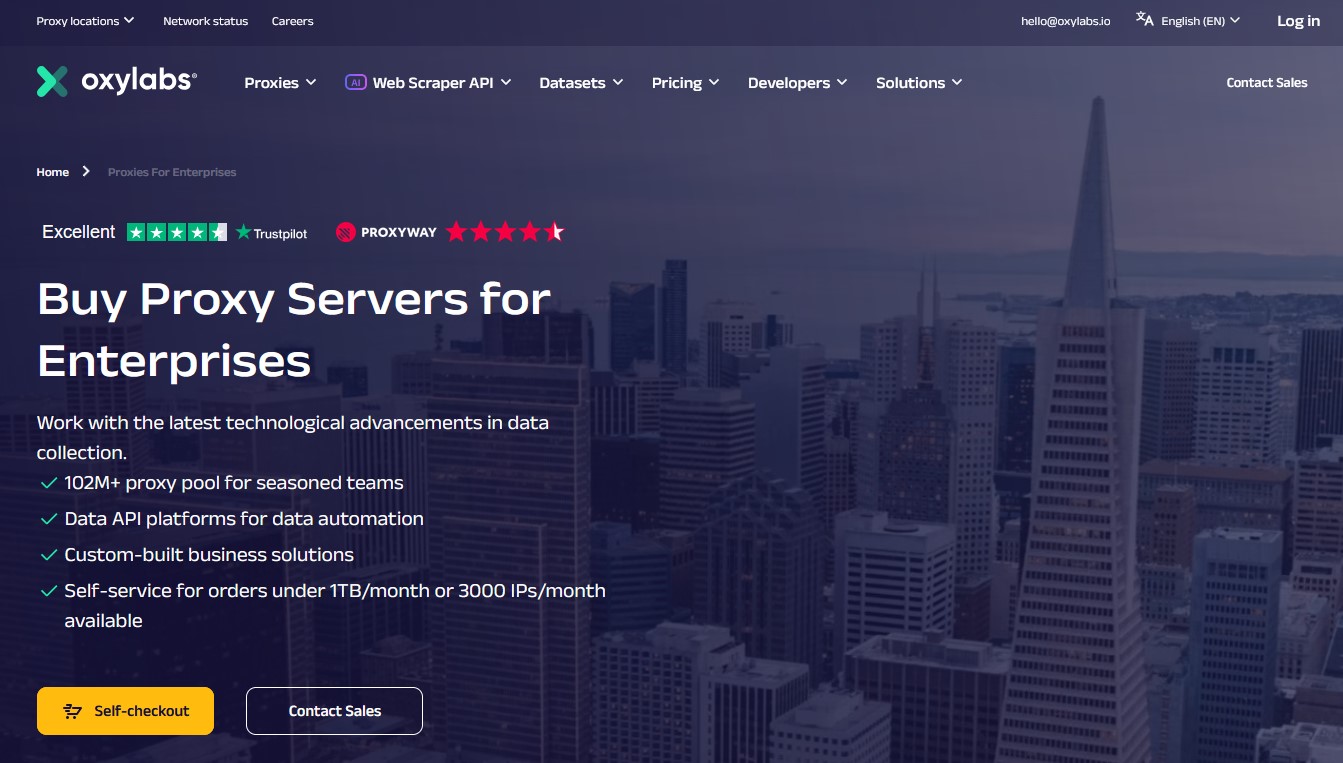
Specifications
Reasons to buy
Reasons to avoid
Oxylabs is something of a legend when it comes to enterprise proxies and for a good reason. It has established itself by delivering rock-solid, scalable solutions for businesses of all shapes and sizes. If your company has some serious proxy needs, Oxylabs has the tools to keep things smooth.
Boasting over 102 million IPs in more than 195 locations, it provides coverage that is hard to match. Whether you require residential, data center, or mobile proxies, it has you covered. Plus, its enterprise-level scalability means it can handle massive volumes of traffic without breaking a sweat.
Want to target a specific city or country? It is not a problem for Oxylabs, as its advanced geo-targeting capabilities let you zero in with precision.
Speed and reliability are baked in, making Oxylabs ideal for everything from web scraping and ad verification to SEO monitoring. And in terms of managing those proxies, you can decide between rotating them every few minutes or keeping sticky IPs for longer sessions.
All of this power is backed by Oxylabs’ dedicated customer support team, which is available 24/7 through every communication channel, as well as seamless API integration, so everything works like a well-oiled machine.
The platform customizes its plans based on your bandwidth usage and particular business requirements. For example, residential proxies start at $8 per GB, ISP proxies at $2.1 per IP, and datacenter IPs at $0.65 per GB. Dedicated datacenter proxies will set you back by $2.75 per IP.
In all fairness, the pricing structure is a bit on the premium side, but certain subscription plans include discounts. What’s more, Oxylabs’ reputation for reliability and scalability makes it worth every penny if you are running a large-scale operation.
Read our full Oxylabs review.
Best for comprehensive data collection
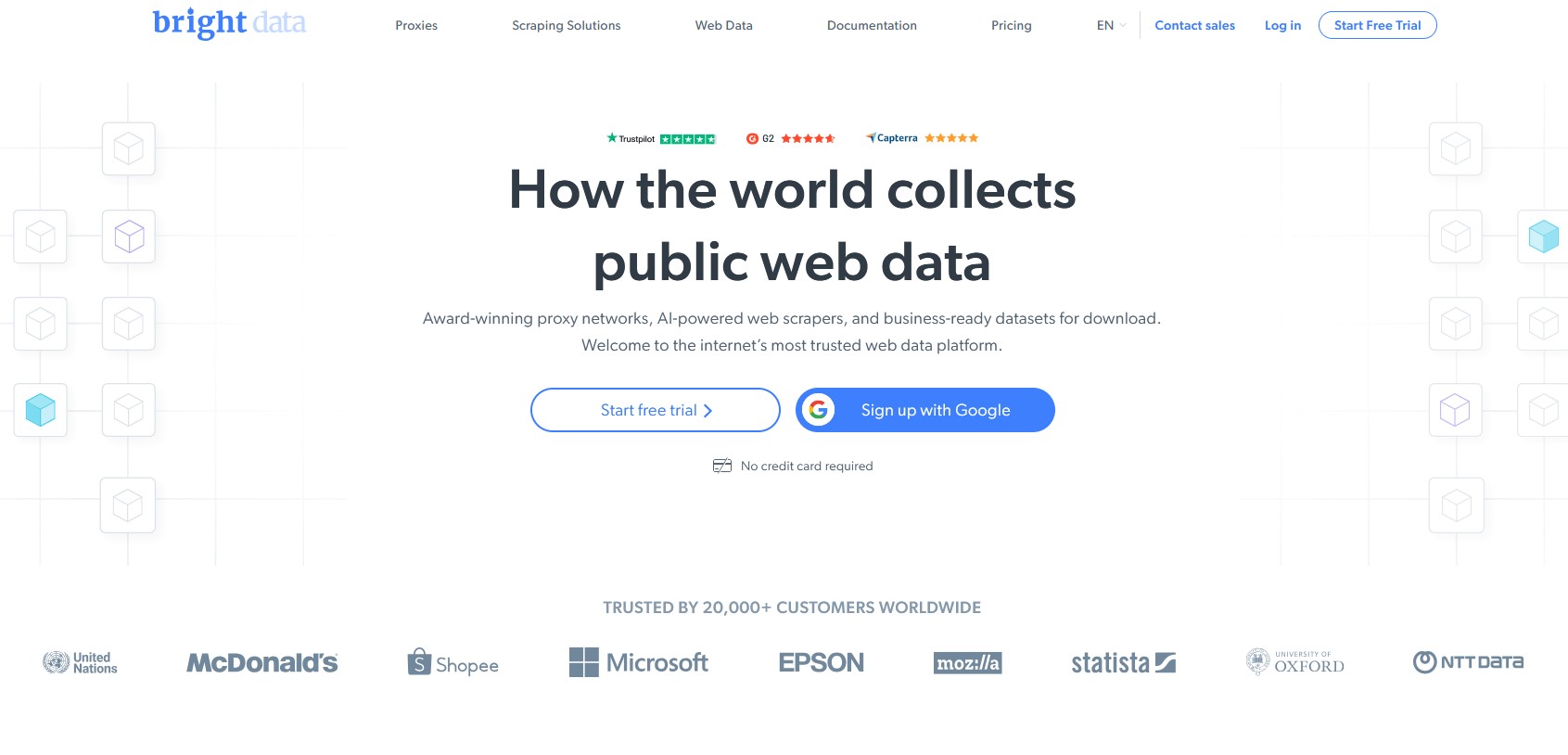
Specifications
Reasons to buy
Reasons to avoid
Another long-standing player in the proxy space, providing premium services since 2014. They’re considered by many the leading proxy providers as they possess a large IP pool of over 72 million addresses across 195 countries, with a customer base of over 20k customers. Similar to Oxylabs they also cover all proxy services (residential, datacenter, mobile, ISP) on both shared and private servers. Traffic routing occurs over HTTP(S) and SOCKS5 protocols. Then, there are some of the best tools for web scraping, data monitoring, ad verification, and much more on offer. All of this can be launched and controlled via a proxy management dashboard with real-time stats and a proxy management desktop app.
Security is top-notch, assisted with one of the best customer support on the market with 24/7 live chat, email support, ticketing, a dedicated account manager for enterprise clients, and detailed sales representatives. Pricing starts from $5.58/GB for residential proxies, $0.42/GB for datacenter proxies, and $5.88/GB for mobile proxies. There are also dataset and market insight packages you can purchase where the company aggregates and scraps data for your needs.
Read our full BrightData review.
Best for mid-sized enterprises
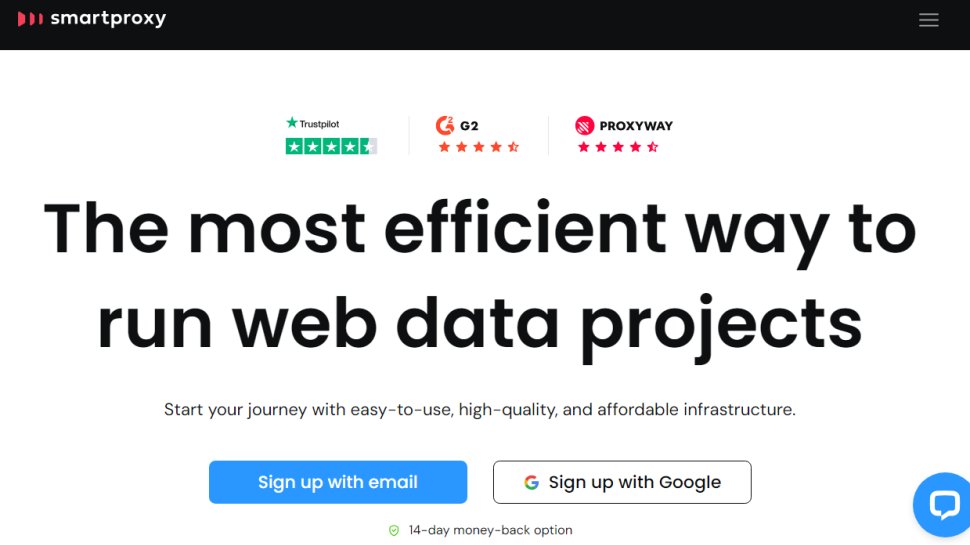
Specifications
Reasons to buy
Reasons to avoid
If you’re a mid-sized business or simply don’t have large-scale data needs, then SmartProxy should be on your list of providers. Also regarded as a premium proxy provider it boasts speeds of less than 0.3s, over 65 million IPs, and 99.99% uptime across 195 locations. Traffic routing occurs over HTTP(S) and SOCKS5 protocols. Geo coverage is also great as you can target down to the city level with static and rotating IPs. Browser extensions are available if you need them to ensure your employees are surfing safely and securely.
Security, like with its competitors, is top-notch, with support that covers all of the basics but is not as thorough as something you get with Bright Data. Proxy pricing starts from $2.2/GB for residential proxies, $0.35/IP for static residential, $4.5/GB for mobile proxies, and $0.09/IP for proxy servers.
Read our full Smartproxy review.
Best for real-time data access
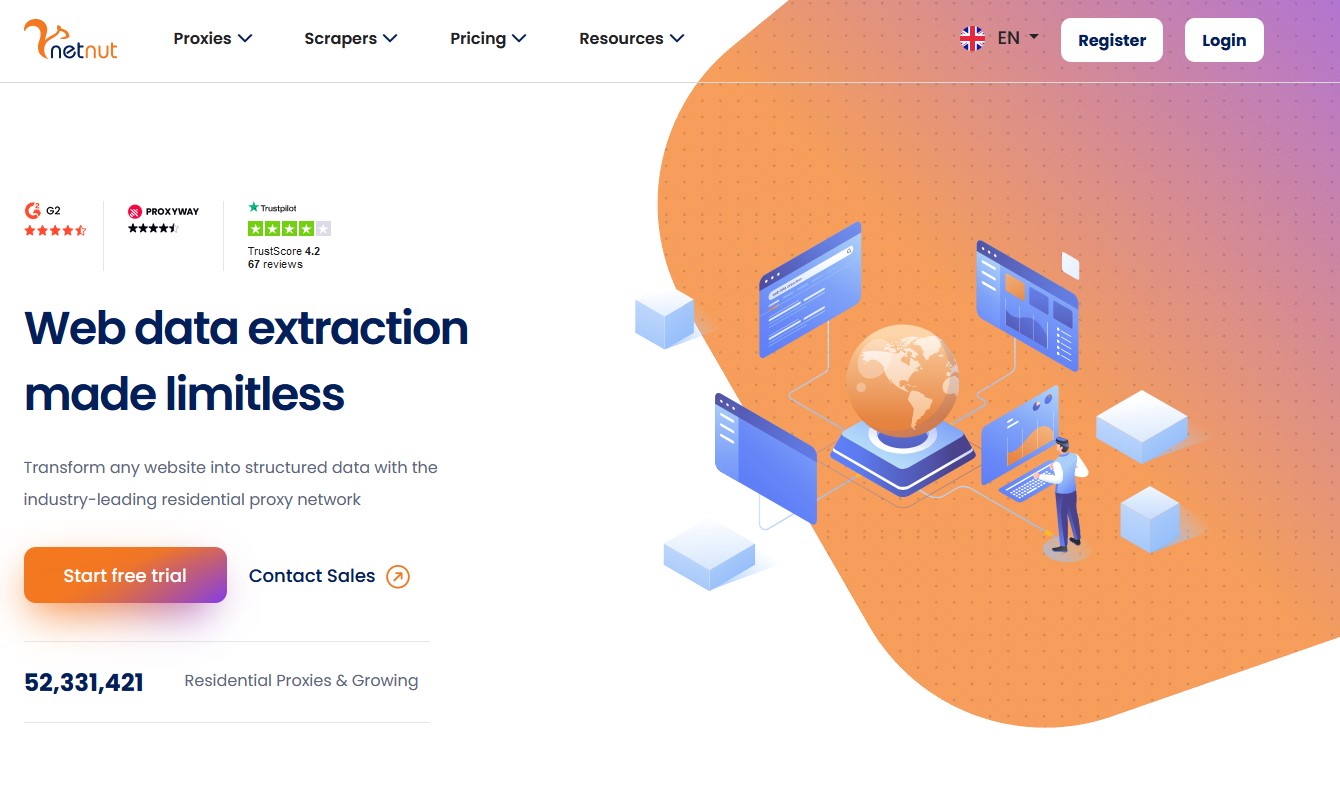
Specifications
Reasons to buy
Reasons to avoid
While not necessarily a premium proxy provider, NetNut is a strong contender for a very solid proxy provider overall. The IP pool of 85 million addresses is ample enough to cover all of your needs, offering residential, datacenter, and mobile proxies in over 195 countries. There is city and state geo-targeting available along with rotating proxies over HTTP(S) and SOCKS5 protocols. Comprehensive statistics are offered through a well-designed dashboard, which can be somewhat customized. The dashboard is also used for real-time proxy management, along with multiple integration options across various tools.
Support and security are up to the standard and can easily give the premium providers a run for their money. Aside from proxies, you can also get a website unblocker that claims a 100% success rate, professional profile data extraction, and company data extraction packages. Rotating residential proxies start from $5, static from $7, and mobile proxies from $9.
Read our full NetNut review.
Best for versatile geotargeting
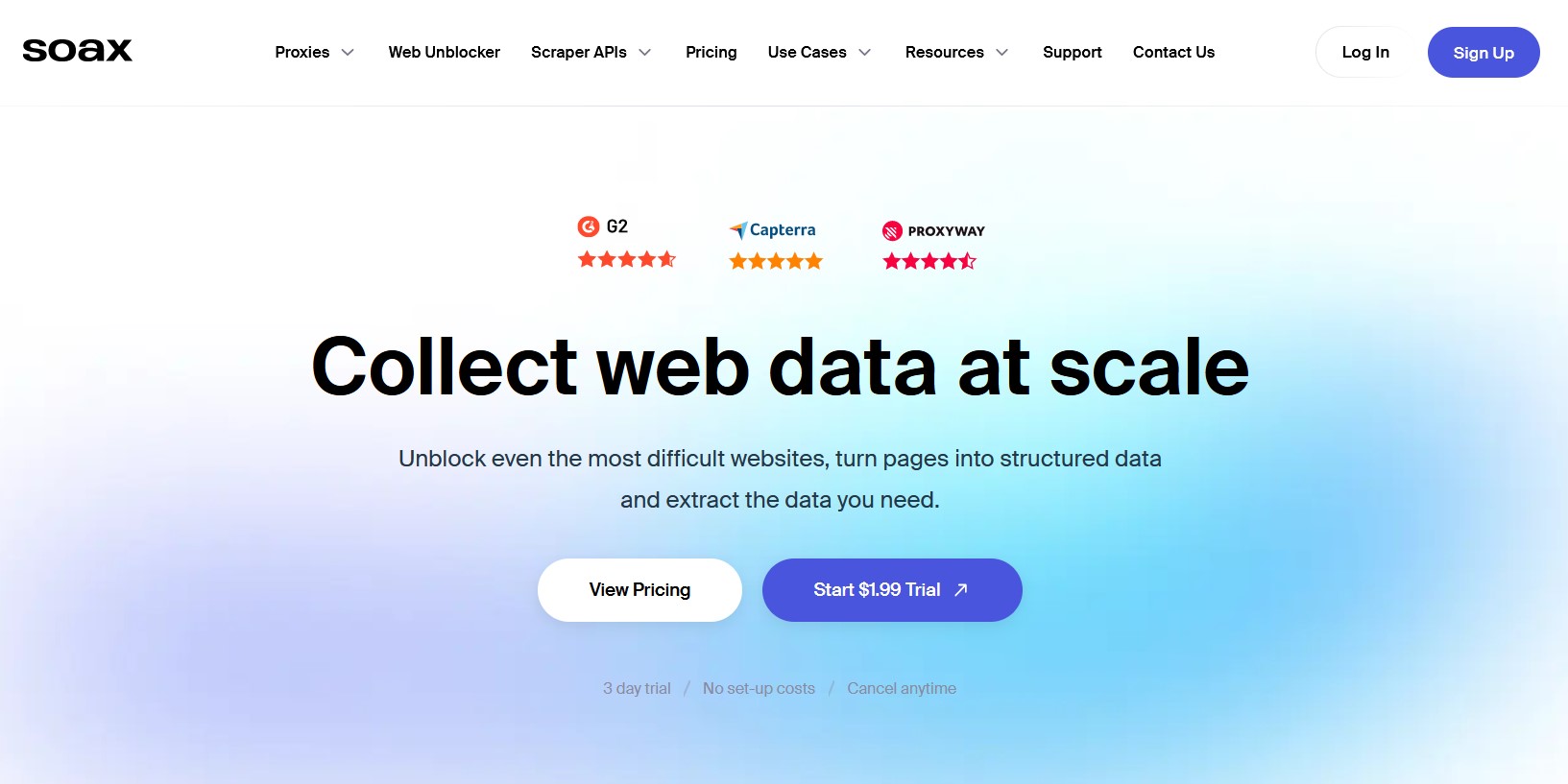
Specifications
Reasons to buy
Reasons to avoid
A newer entrant into the proxy field (2019), Soax boasts the largest IP pool with over 155 million addresses across 195 countries, with a 0.55s proxy response time. Similar to their competitors, you can also get a website unblocker, numerous integrations as well as proxies for specific use cases (sneaker proxies, etc.). Outside of that the offering is the same as with the above-described competitors, covering the same network protocols and proxy networks.
One distinguishing factor is their customer support, which is one of the best, if not, the best in the business. Security is also top-notch with ethically sourced IPs and regulations that the company follows. Residential proxies start at $2.2/GB, and mobile and US ISPs also at the same price of $2.2/GB. Datacenter proxies start at $0.4/GB.
Read our full Soax review.
FAQs
What are enterprise proxies?
Enterprise proxies are advanced proxy services designed to support large-scale operations, offering features like extensive IP pools, high security, and robust management tools. They are essential for activities like web scraping, ad verification, and managing multiple online accounts.
How to choose the right proxy service for enterprises?
When selecting a proxy service for your enterprise, consider the following key factors:
- IP pool size and diversity: Large and varied IP pool is essential if you’re looking for a provider for your enterprise. This ensures better access to global content and reduces the risk of IP bans.
- Network type: The offer should cover residential, datacenter, ISP and mobile proxies at the least. Residential proxies are ideal for scraping and account management, while datacenter proxies offer higher speed for large-scale data collection and offer greater security.
- Scalability: Look for options that allow easy scaling without compromising performance. Furthermore, you need to consider your bandwidth needs and look for unlimited traffic offers if you plan on using proxies for large-scale operations.
- Security and compliance: Enterprise proxies must offer robust security features, including data encryption and IP rotation, to protect your operations. Moreover, proxy providers must offer ethically sourced IPs and data protection regulations such as GDPR or CCPA.
- Support and management tools: Opt for a provider that offers comprehensive management tools, including real-time analytics, proxy rotation, and easy integration with your existing systems. Strong customer support is also crucial for resolving any issues quickly.
- Pricing: Enterprise proxy providers often offer custom pricing models for which you need to get in touch with them, but it can be worth it as they can be more cost-effective if you have specific requirements. Consider the total cost of ownership, including any additional fees for features like API access or premium support.
How to choose the best proxy service for enterprises?
Consider the size and diversity of the IP pool, the network types offered, scalability, security features, and compliance with legal standards. Additionally, evaluate the provider’s customer support and pricing structure to ensure it fits your business needs.
Are enterprise proxies legal?
Yes, when used in compliance with the terms of service of the sites you are accessing and with data protection regulations.
Conclusion
Choosing the right proxy provider for your enterprise may seem more difficult today than ever. Most of the offerings are pretty similar and there are only slight differences between the premium offerings. To choose the best one for you, the initial step is to analyze your business needs, compare the pricing, and consider any special use cases that you might have. Next, evaluate your long-term needs and see what type of scaling options you have. We’re sure that there is a right offer in the list above, as the offering covers premium and up-and-coming providers.
Are you a pro? Subscribe to our newsletter
Sign up to the TechRadar Pro newsletter to get all the top news, opinion, features and guidance your business needs to succeed!
Sead is a seasoned freelance journalist based in Sarajevo, Bosnia and Herzegovina. He writes about IT (cloud, IoT, 5G, VPN) and cybersecurity (ransomware, data breaches, laws and regulations). In his career, spanning more than a decade, he’s written for numerous media outlets, including Al Jazeera Balkans. He’s also held several modules on content writing for Represent Communications.